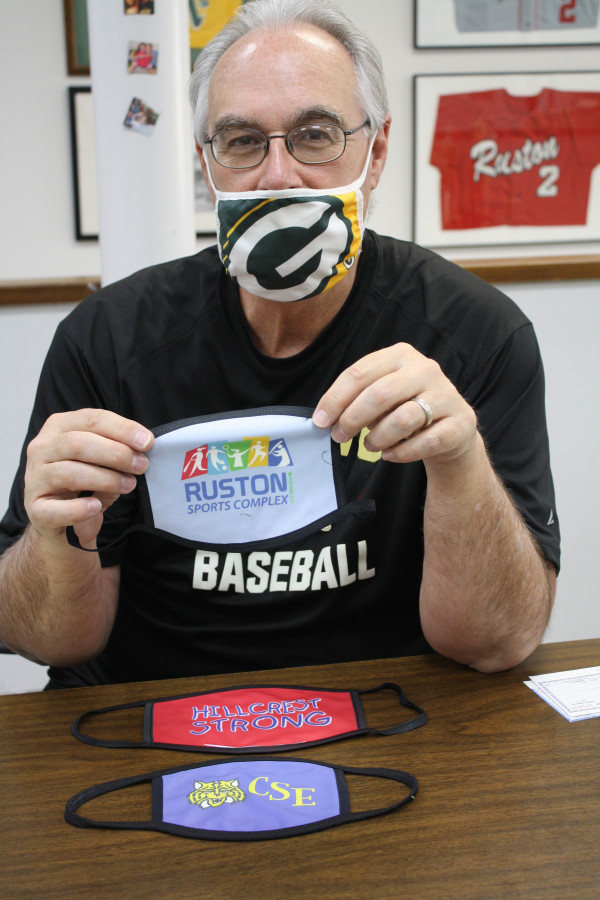Pandemic forces businesses to modify

Leader photo by NANCY BERGERON
Mark Cramer, owner of Champion Trophies, shows off masks his company made during the COVID-19 pandemic.
Editor’s Note: This is the second of a threepart series focusing on the one-year mark of the COVID-19 pandemic in Lincoln Parish.
COVID-19’s economic cloud drifted over Louisiana businesses one year ago today when the state’s gubernatorially mandated stay-at-home order went into effect.
For the next 53 days, most non-essential businesses were temporarily closed.
“It was scary because you really didn’t know what was coming down the line,” Ruston-Lincoln Chamber of Commerce President Judy Copeland said. “I remember thinking, ‘Oh my goodness, what’s going to happen to all our businesses? What’s going to happen to our community?’”
Though several businesses did close permanently during 2020, Copeland said it’s hard to attribute those closures to COVID. She said most of the businesses that shut down were on the cusp of doing so before the pandemic hit.
Nobody keeps an official list of closures, but representatives of several local commerce groups placed the total at around four.
Every business has its own story of adjusting to COVID-19. Some fared better than others.
But overall, instead of quashing the local economy, as people feared early on, the pandemic forced merchants to adapt, said Amy Stegall, coordinator of Ruston’s downtown Main Street program.
“I saw businesses really think outside the box. A lot of them switched immediately to online platforms, and they thrived,” Stegall said.
Travis Lee, owner of the Chartreuse Pear, was one of them.
“I knew we were going to have to pivot the business if we were going to survive,” Lee said.
He watched YouTube videos on how to build a successful website and slowly began putting pictures of every item in the home décor and clothing specialty shop online. Over the last year, Lee has shipped items to 43 states, including Alaska and Hawaii.
“The website has been a great addition. It’s almost like having two stores,” he said.
Trophy shop owner Mark Cramer has been in business 33 years. But he almost didn’t survive the first year of the COVID economy.
“I came close to having to close three or four times,” Cramer said.
Cramer was ready for another busy awards season last spring when he suddenly realized that wasn’t going to happen. COVID-19 claimed sports, largegroup gatherings and festivals among its early victims.
“That’s my bread and butter,” he said.
April, May and June are typically Champion Trophy’s busiest months.
But in 2020, “I literally had days when no customers came in,” Cramer said. “There were times I couldn’t afford to pay myself.”
Cramer turned to Louisiana’s Main Street Recovery Program for help. The program offered COVID relief grants to small businesses. That helped. So did Louisiana’s mask mandate that went into effect July 13.
Cramer partnered with a local apparel shop to make custom masks — about 2,000 of them for schools, churches and other groups. The apparel shop did the artwork; Cramer did the printing. The two businesses split the costs and the profit.
“It helped both of us stay afloat during that time,” Cramer said.
Business is better now.
“As long as they don’t cancel spring sports in high school, it should be a corner-turner for the awards industry,” Cramer said.
Robyn Brown’s real estate business turned a corner during the height of the pandemic.
After an initial decline, Heritage Realty doubled in revenue and employees by 2020’s end, Brown said.
“Our business dipped significantly during the stay-at-home order, but buyers and sellers were ready to make a move after spending so much time at home,” Brown said.
She sold four houses to clients, sight unseen.
Like Lee, Brown spiffed up her website and expanded her social media. She did video home showings and online neighborhood tours in lieu of meeting clients face-to-face.
“The word of the year turned out to be ‘modify,’” Brown said.
Copeland said the changes forced on the business community by COVID-19 aren’t all bad.
“A lot of people learned how to reduce overhead and be more efficient,” she said.
Copeland said she thinks part of the reason Ruston has weathered the pandemic as well as it has is that people continue to support local merchants.
“Ruston is just that kind of town,” she said.

